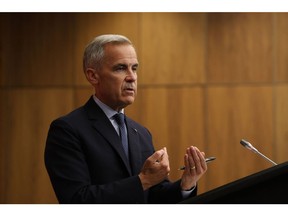
Article content
(Bloomberg) — Prime Minister Mark Carney said Canada will look for opportunities to remove some counter-tariffs against the US, despite winning an election in which he pledged to fight back against President Donald Trump’s trade war.
THIS CONTENT IS RESERVED FOR SUBSCRIBERS ONLY
Subscribe now to read the latest news in your city and across Canada.
- Exclusive articles from Barbara Shecter, Joe O'Connor, Gabriel Friedman, and others.
- Daily content from Financial Times, the world's leading global business publication.
- Unlimited online access to read articles from Financial Post, National Post and 15 news sites across Canada with one account.
- National Post ePaper, an electronic replica of the print edition to view on any device, share and comment on.
- Daily puzzles, including the New York Times Crossword.
SUBSCRIBE TO UNLOCK MORE ARTICLES
Subscribe now to read the latest news in your city and across Canada.
- Exclusive articles from Barbara Shecter, Joe O'Connor, Gabriel Friedman and others.
- Daily content from Financial Times, the world's leading global business publication.
- Unlimited online access to read articles from Financial Post, National Post and 15 news sites across Canada with one account.
- National Post ePaper, an electronic replica of the print edition to view on any device, share and comment on.
- Daily puzzles, including the New York Times Crossword.
REGISTER / SIGN IN TO UNLOCK MORE ARTICLES
Create an account or sign in to continue with your reading experience.
- Access articles from across Canada with one account.
- Share your thoughts and join the conversation in the comments.
- Enjoy additional articles per month.
- Get email updates from your favourite authors.
THIS ARTICLE IS FREE TO READ REGISTER TO UNLOCK.
Create an account or sign in to continue with your reading experience.
- Access articles from across Canada with one account
- Share your thoughts and join the conversation in the comments
- Enjoy additional articles per month
- Get email updates from your favourite authors
Sign In or Create an Account
or
Article content
Carney said it’s because he wants to maximize the impacts of retaliatory tariffs on the US but minimize the pain for Canadian businesses.
Article content
Article content
Article content
“We don’t automatically adjust; we look at what we can do for our industry that’s most effective,” Carney said in West Kelowna, British Columbia. “In some cases, that will be to remove tariffs. We have removed some tariffs over time so that, for example, the auto industry can function more effectively. And we’ll look at opportunities to do so.”
Article content
By signing up you consent to receive the above newsletter from Postmedia Network Inc.
Article content
To try and bolster the auto sector, in April Carney offered counter-tariff relief to carmakers — but only if they invest and produce vehicles in Canada. As recently as June, Carney said Canada would adjust its existing counter-tariffs on steel and aluminum based on discussions with the US. The US has since raised some Canadian tariffs, but Canada has not retaliated.
Article content
Carney’s latest comments underscore a politically awkward compromise as he seeks to minimize damage to domestic business and labor while standing firm against Trump. The president has not only imposed a broadside of tariffs but infuriated many Canadians by saying their country should be a 51st US state.
Article content
Carney narrowly won an election in April touting slogans like “Canada Strong” and “Elbows Up,” the latter phrase meant to evoke warding off belligerent opponents in the national sport of ice hockey.
Article content
Article content
The remarks highlight the shift since Carney’s predecessor Justin Trudeau backed the principle of “dollar-for-dollar” reprisals and imposed counter-tariffs on C$60 billion ($43.6 billion) in US goods in March. If Canadians expected other countries to follow suit, the months since have proved disappointing: Although the European Union and Mexico have discussed counter-measures, they have held off, leaving Canada and China the lone retaliators.
Article content
The White House cited Canada’s counter-tariffs as part of its justification for increasing headline tariffs to 35% from 25% on some Canadian products last week. The majority of goods, however, remain exempt, covered by the US-Mexico-Canada trade deal Trump signed during his first term in office.
Article content
Last month, British Columbia Premier David Eby told Bloomberg he didn’t think additional counter-tariffs would change Trump’s mind, but could still inflict harm on Canada’s third most-populous province. That’s because it’s difficult for BC businesses to replace American steel and aluminum by paying to ship the heavy commodities from Canadian smelters in the east, thousands of miles away by rail.
Article content
Nonetheless, Canadian voters still favor a “hardball” response, refusing concessions, according to polling by Angus Reid following the latest increase in US import taxes.
Article content

.jpg) 14 hours ago
3
14 hours ago
3
 English (US)
English (US)